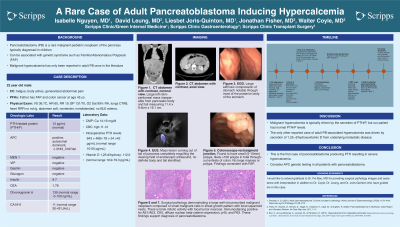Monday Poster Session
Category: Biliary/Pancreas
P1565 - A Rare Case of Adult Pancreatoblastoma-Inducing Hypercalcemia
Monday, October 23, 2023
10:30 AM - 4:15 PM PT
Location: Exhibit Hall

Has Audio

Isabelle Nguyen, MD
Scripps Clinic
San Diego, CA
Presenting Author(s)
Isabelle Nguyen, MD1, David Leung, MD2, Liesbet Joris-Quinton, MD2, Jonathan Fisher, MD2, Walter Coyle, MD2
1Scripps Clinic, San Diego, CA; 2Scripps Clinic, La Jolla, CA
Introduction: Pancreatoblastoma (PB) is a rare malignant pediatric neoplasm of the pancreas typically diagnosed in children < 10 years old. PB is uncommon in pediatric populations, with a low incidence of 0.004/100,000 cases annually. Adult PB is exceedingly rare, with less than 75 cases reported in the literature. While most reported cases are sporadic, PB can be associated with genetic syndromes such as Familial Adenomatous Polyposis (FAP). Malignant hypercalcemia is common (20-30%) in cancer but has only been reported in adult PB once prior in the literature.
Case Description/Methods: A 22-year-old male, with a first-degree relative history of FAP was found to have PTH mediated hypercalcemia with an elevated PTH level of 843pg/mL (normal range 10-55pg/mL) and normal PTH-related protein (PTHrP). His calcium levels ranged from 14-16 mg/dl. As a result, he underwent parathyroidectomy for primary hyperparathyroidism. Despite surgical intervention, his calcium and PTH levels did not normalize. His intermittent epigastric pain which was initially attributed to hypercalcemia prior to his surgery worsened, leading to additional imaging studies. Computed tomography images showed a large retroperitoneal pancreatic mass. Endoscopic ultrasound (EUS) revealed a ~11x8 cm pancreatic tail mass. Fine-needle biopsy was performed and demonstrated pancreatoblastoma. PET (Positron Emission Tomography) scan confirmed the primary lesion without evidence of metastatic disease. Preoperative endoscopy showed a duodenal adenoma along with >100 small colonic polyps, with pathology showing tubular adenomas, along with a positive APC gene mutation. After distal pancreatectomy and surgical resection of the tumor, calcium and PTH levels normalized.
Discussion: Adult PB is a rare pancreatic neoplasm typically seen in children and accounts for < 0.5% of exocrine pancreatic cancers. Malignant hypercalcemia is typically driven by the secretion of PTHrP, but our patient had normal PTHrP levels. The only other reported case of adult PB-associated hypercalcemia was driven by secretion of 1,25- dihydroxyvitamin D from underlying metastatic disease. We postulate that the patient’s severe hypercalcemia is driven by ectopic PTH secretion from the pancreatoblastoma as this was reversed by surgical removal of the mass. While adult PB Is extremely rare, this case makes the argument to consider APC genetic testing in all patients with pancreatoblastoma. We present the first case of a pancreatoblastoma producing PTH resulting in severe hypercalcemia.
Disclosures:
Isabelle Nguyen, MD1, David Leung, MD2, Liesbet Joris-Quinton, MD2, Jonathan Fisher, MD2, Walter Coyle, MD2. P1565 - A Rare Case of Adult Pancreatoblastoma-Inducing Hypercalcemia, ACG 2023 Annual Scientific Meeting Abstracts. Vancouver, BC, Canada: American College of Gastroenterology.
1Scripps Clinic, San Diego, CA; 2Scripps Clinic, La Jolla, CA
Introduction: Pancreatoblastoma (PB) is a rare malignant pediatric neoplasm of the pancreas typically diagnosed in children < 10 years old. PB is uncommon in pediatric populations, with a low incidence of 0.004/100,000 cases annually. Adult PB is exceedingly rare, with less than 75 cases reported in the literature. While most reported cases are sporadic, PB can be associated with genetic syndromes such as Familial Adenomatous Polyposis (FAP). Malignant hypercalcemia is common (20-30%) in cancer but has only been reported in adult PB once prior in the literature.
Case Description/Methods: A 22-year-old male, with a first-degree relative history of FAP was found to have PTH mediated hypercalcemia with an elevated PTH level of 843pg/mL (normal range 10-55pg/mL) and normal PTH-related protein (PTHrP). His calcium levels ranged from 14-16 mg/dl. As a result, he underwent parathyroidectomy for primary hyperparathyroidism. Despite surgical intervention, his calcium and PTH levels did not normalize. His intermittent epigastric pain which was initially attributed to hypercalcemia prior to his surgery worsened, leading to additional imaging studies. Computed tomography images showed a large retroperitoneal pancreatic mass. Endoscopic ultrasound (EUS) revealed a ~11x8 cm pancreatic tail mass. Fine-needle biopsy was performed and demonstrated pancreatoblastoma. PET (Positron Emission Tomography) scan confirmed the primary lesion without evidence of metastatic disease. Preoperative endoscopy showed a duodenal adenoma along with >100 small colonic polyps, with pathology showing tubular adenomas, along with a positive APC gene mutation. After distal pancreatectomy and surgical resection of the tumor, calcium and PTH levels normalized.
Discussion: Adult PB is a rare pancreatic neoplasm typically seen in children and accounts for < 0.5% of exocrine pancreatic cancers. Malignant hypercalcemia is typically driven by the secretion of PTHrP, but our patient had normal PTHrP levels. The only other reported case of adult PB-associated hypercalcemia was driven by secretion of 1,25- dihydroxyvitamin D from underlying metastatic disease. We postulate that the patient’s severe hypercalcemia is driven by ectopic PTH secretion from the pancreatoblastoma as this was reversed by surgical removal of the mass. While adult PB Is extremely rare, this case makes the argument to consider APC genetic testing in all patients with pancreatoblastoma. We present the first case of a pancreatoblastoma producing PTH resulting in severe hypercalcemia.
Disclosures:
Isabelle Nguyen indicated no relevant financial relationships.
David Leung indicated no relevant financial relationships.
Liesbet Joris-Quinton indicated no relevant financial relationships.
Jonathan Fisher indicated no relevant financial relationships.
Walter Coyle: Abbvie Pharma – Speakers Bureau. Regeneron Pharma – Speakers Bureau.
Isabelle Nguyen, MD1, David Leung, MD2, Liesbet Joris-Quinton, MD2, Jonathan Fisher, MD2, Walter Coyle, MD2. P1565 - A Rare Case of Adult Pancreatoblastoma-Inducing Hypercalcemia, ACG 2023 Annual Scientific Meeting Abstracts. Vancouver, BC, Canada: American College of Gastroenterology.
